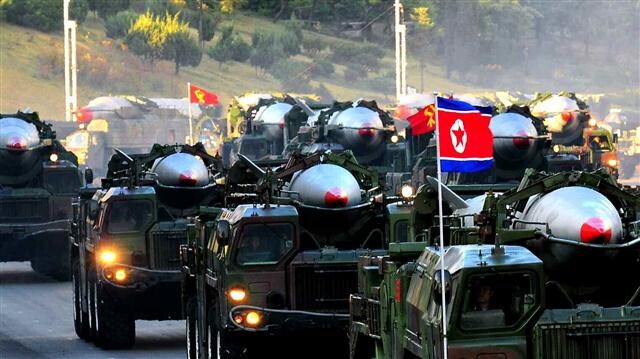hankyoreh
Links to other country sites 다른 나라 사이트 링크
US and China agree to draft of UN sanctions on North Korea

On Feb. 24, the US and China agreed to a draft of a UN Security Council resolution that will place sanctions on North Korea for its recent nuclear test and long-range missile launch. The sanctions resolution is expected to be adopted by a full session of the Security Council as early as Feb. 26 or Feb. 29, nearly 50 days after Pyongyang carried out its nuclear test on Jan. 6
On Thursday, a high-ranking source at the UN said that the US and China had reached an agreement on a draft of the Security Council‘s sanctions resolution against North Korea.
“National Security Advisor Susan E. Rice [and . . .] Chinese Foreign Minister Wang Yi [. . .] agreed on the importance of a strong and united international response to North Korea’s provocations, including through a UN Security Council Resolution that goes beyond previous resolutions,” said White House National Security Council Spokesperson Ned Price in a statement.
The US-China draft was circulated to the other three permanent members of the UN Security Council (Russia, the UK and France) on Thursday, AFP reported.
On Feb. 25, a closed meeting will be held of all 15 members of the Security Council - including the five permanent members and the 10 non-permanent members - to discuss the US-China draft.
If a final agreement is reached on the resolution draft in this meeting, the sanctions resolution will be officially adopted as early as Feb. 26 or on Feb. 29, following one or two days of administrative work.
The draft of the sanctions resolution reportedly will place sanctions on North Korea’s Reconnaissance General Bureau, which is in charge of espionage in South Korea and other countries, as well as the Ministry of Atomic Energy Industry and the National Aerospace Development Administration, which are directly and indirectly involved in the development of nuclear weapons and missiles.
While placing sanctions on these organizations has symbolic value, it is unlikely to be very effective, since they have few overseas assets or accounts, and the ones they do have are shrouded in secrecy. It was not confirmed whether a worldwide ban on allowing North Korean ships to enter foreign ports - which had been strongly advocated by the US and South Korea - was included in the draft reached by the US and China.
Another big question is to what extent China’s demand for the inclusion of conditions for resuming the Six-Party Talks was reflected in the sanctions resolution.
“The draft of the Security Council resolution was prepared with the cooperation of the US and South Korea based on the elements in the initial draft that we provided, and it contains a large number of elements that are tougher and more effective than at any time in the past,” said South Korean Foreign Ministry Spokesperson Cho Joon-hyuk during the regular press conference on Feb. 25.
By Lee Je-hun, staff reporter
Please direct questions or comments to [english@hani.co.kr]

Editorial・opinion
![[Guest essay] Maybe Korea’s rapid population decline is an opportunity, not a crisis [Guest essay] Maybe Korea’s rapid population decline is an opportunity, not a crisis](https://flexible.img.hani.co.kr/flexible/normal/500/300/imgdb/original/2024/0430/9417144634983596.jpg) [Guest essay] Maybe Korea’s rapid population decline is an opportunity, not a crisis
[Guest essay] Maybe Korea’s rapid population decline is an opportunity, not a crisis![[Column] Can Yoon steer diplomacy with Russia, China back on track? [Column] Can Yoon steer diplomacy with Russia, China back on track?](https://flexible.img.hani.co.kr/flexible/normal/500/300/imgdb/original/2024/0430/1617144616798244.jpg) [Column] Can Yoon steer diplomacy with Russia, China back on track?
[Column] Can Yoon steer diplomacy with Russia, China back on track?- [Column] Season 2 of special prosecutor probe may be coming to Korea soon
- [Column] Park Geun-hye déjà vu in Yoon Suk-yeol
- [Editorial] New weight of N. Korea’s nuclear threats makes dialogue all the more urgent
- [Guest essay] The real reason Korea’s new right wants to dub Rhee a founding father
- [Column] ‘Choson’: Is it time we start referring to N. Korea in its own terms?
- [Editorial] Japan’s rewriting of history with Korea has gone too far
- [Column] The president’s questionable capacity for dialogue
- [Column] Are chaebol firms just pizza pies for families to divvy up as they please?
Most viewed articles
- 1‘We must say no’: Seoul defense chief on Korean, USFK involvement in hypothetical Taiwan crisis
- 2After election rout, Yoon’s left with 3 choices for dealing with the opposition
- 3Why Kim Jong-un is scrapping the term ‘Day of the Sun’ and toning down fanfare for predecessors
- 4Two factors that’ll decide if Korea’s economy keeps on its upward trend
- 5Noting shared ‘values,’ Korea hints at passport-free travel with Japan
- 6AI is catching up with humans at a ‘shocking’ rate
- 7[Correspondent’s column] The US and the end of Japanese pacifism
- 8A week of protests lays bare many inherent vices of Korean health care system
- 9[Editorial] As it bolsters its alliance with US, Japan must be accountable for past
- 10[Editorial] Japan’s rewriting of history with Korea has gone too far